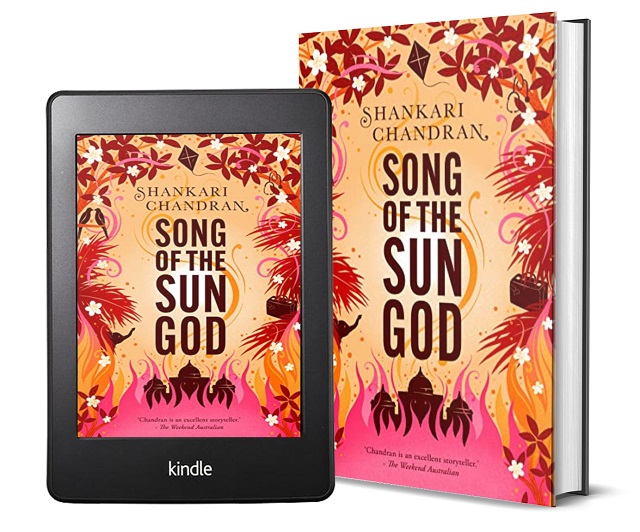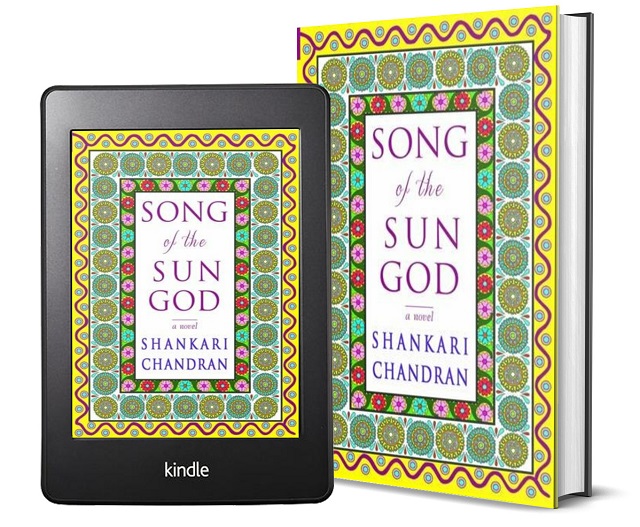War has been a perpetual part of human interactions as far as we have been documenting our lives and in spite of countless examples of wars of years past, every generation finds themselves embroiled into the battle of ‘us vs them’. Sometimes, it is purely a matter of chance and luck based on lottery of the birth that we find ourselves in places. where we cannot escape conflict.
Sri Lanka has been embroiled into cultural conflict since its independence from the British empire and recently we came across author Shankari Chandran‘s book that charts the lives of a family of Sri Lankan Tamils as they live through these decades of changes and warfare and find themselves travelling across continents to find a place where they can live without fear. Called Song of the Sun God this is the author’s third book and has been well recieved by readers.
| Book Title | : | Song of the Sun God |
| Author | : | Shankari Chandran |
| Published by | : | Ultimo Press |
| # of Pages | : | 385 (Paperback) 878 Minutes (Audiobook) |
| # of Chapters | : | 24 |
| Purchase Link(s) | : |
|
This Is Here In For You
Book Cover:
Let us take a look at the cover page of this book.

Song of the Sun God by Shankari Chandran | Book Cover
The cover page of this book is designed to convey the warmth of a tropical climate, the richness of Asian cultures using rich colors. The fire in the center symbolizes so many life altering rituals and the growing light making its way towards the sun in the center. All around these are the trees with beautiful flowers, a stethoscope, a pair of birds and a baby elephant, all the elements of the story that unfolds within its pages.
The previous version of the book had a different cover page that was simple and minimalistic.

Song of the Sun God by Shankari Chandran | Book Cover
An attractive cover page that has a hopeful note to it in spite of the tragedies conveyed in the book.
Storyline:
The year is 1932 and young Rajan is confronted with death of his older sister. In the same country, Nala is growing up in a family with siblings and cousin Mohan. Lives of these two merge when they are married to each other as generations of Tamil youngsters have been joined by their families for generations.
Rajan is a bright young surgeon in Columbo and that’s where they start their married life. Their daughter Priya is born and after losing a few babies, finally they have their son Nandan. Meanwhile, Mohan has married Vani, against the societal norms as they belong to different castes. Mohan finds an Engineering job in Northern village of Gal Oya.
But while they have been venturing in their adult lives, the country has been slowly led to the path of separating the Sinhalese and Tamil segments of the population and violence erupts sporadically between the groups across the country. The riots in Gal Oya result in Mohan’s death and the brutalities of the riots leave Vani traumatised.
Rajan travels to the disturbed North and brings Mohan’s young daughter Dhara to live with his family. From hereon, Priya and Dhara become inseparable sisters, bound in the love for each other. As the girls grow up, Rajan encourages both of them towards his own profession and in spite of her own wishes to learn home economics, Priya gives in. Both sisters study medicine.
As they grow up, they find a match for Dhara in Siva, but as luck would have it, he is married to Priya. With the growing unease in the country and the climate of separtion, Rajan attempts to move to London, but Nala wants to stay in Sri Lanka. However, they send Priya and Siva to London. Here, Priya has their first child Vivek, but is unable to have any more children.
On one of her visits to Jaffna, Dhara is attacked and although she is eventually returned to her family, with marks of brutality all over her body and soul, she has lost her pathway to normal life. When she gives birth to Smrithi, she gives the child over to her sister Priya to raise as her own daughter.
As another generation grows up and finds their place in the world, the whole family ends up in Australia, except for Dhara. As they learn to live in yet another place, where they stand out as different, how will the family cope with the continuous struggle of adapting?
Views and Reviews:
Being a story of lives lived and families built amidst trials and tribulations of changing times, the story also draws a fair bit from the cultural heritage that the Sri Lankan Tamils pass on – including the epics Ramayana and Mahabharata. There could hardly be a more moving story of war then the Mahabharata where the winners really have nothing to rule over. And yet, it seems we take a very long time to learn the lessons. As Rajan says in his old age, when he has finally learnt not to be a hasty judge of others:
It’s the young who have learned judgement but not yet compassion.
In this case, the differences driving the civil war are the cultural heritage, religion and langugae, but really, there are so many different places where such civil wars have happened? Even the adapted country of the Sri Lankan family in this book Australia, has a past of decimating the indigenous culture of Australian native tribes and struggles with racial violence and intolerance against refugees. Where the political opinions are widely varied on their treatment of botloads of people arriving on their shores:
It isn’t illegal to seek protection. It is illegal and inhumane to deny it.
The difference between degrees of a difficult solutions are the respect we show the refugees; and the dignity we allow them.
And although the above makes the wider backdrop of the book, its strength is the evocative emotions with which Shankari Chandran builds the family and three generations – all supporting each other with love and care.
She reminds us of how beautiful it is to welcome new life and nurture it, protect your children and grandchildren from the world as best as you can, laugh with them and mourn with them, swim with them and sink with them. There will always be challenges and sorrows in every life, but with your family you can get through these tough times.
The bond of love that this family creates and how they envelope each other in it, helps them survive and travel across three continents. They all think, they made mistakes, feel guilty about not being able to protect one another and still that’s what life is. We muddle through the best we can. If you are facing a raging fire, you would throw over your children over walls, hoping there would be safety on the other side.
The book is a good reminder of how difficult life is in a nation where you are made to feel as if you do not belong. No matter where you are in the world, it is important for humans to feel welcomed and belonging to their communities. If we are to ever build a better world, it may not be wealthier or prettier, but it certainly would have to be kinder…
Summary:
A book describing journey of a family over decades and generations as they try to escape a war in their homeland and find a life across the world…
ThinkerViews Rating:
Around 7.5 stars out of 10.
Quick Purchase Links:
- Buy - Song of the Sun God by Shankari Chandran - Paperback - Amazon IN
- Buy - Song of the Sun God by Shankari Chandran - Kindle EBook - Amazon IN
- Buy - Song of the Sun God by Shankari Chandran - Audiobook - Amazon IN
- Buy - Song of the Sun God by Shankari Chandran - Paperback - Amazon US
- Buy - Song of the Sun God by Shankari Chandran - Audiobook - Amazon US
Over To You:
If you already have read the book do share your remarks and thoughts via comments below. Does this review help you in making your decision to buy or read the book? Do not forget to share this article with your friends over various social networks. Please follow/subscribe us on various Social networks like Twitter, Facebook, YouTube, Spotify, Amazon Prime Music, Audible, and others. And yes, you may like to subscribe to our RSS feeds to get latest updates for the site to land right in your mail box.
 ThinkerViews – Views And Reviews Personal views and reviews for books, magazines, tv serials, movies, websites, technical stuff and more.
ThinkerViews – Views And Reviews Personal views and reviews for books, magazines, tv serials, movies, websites, technical stuff and more.



